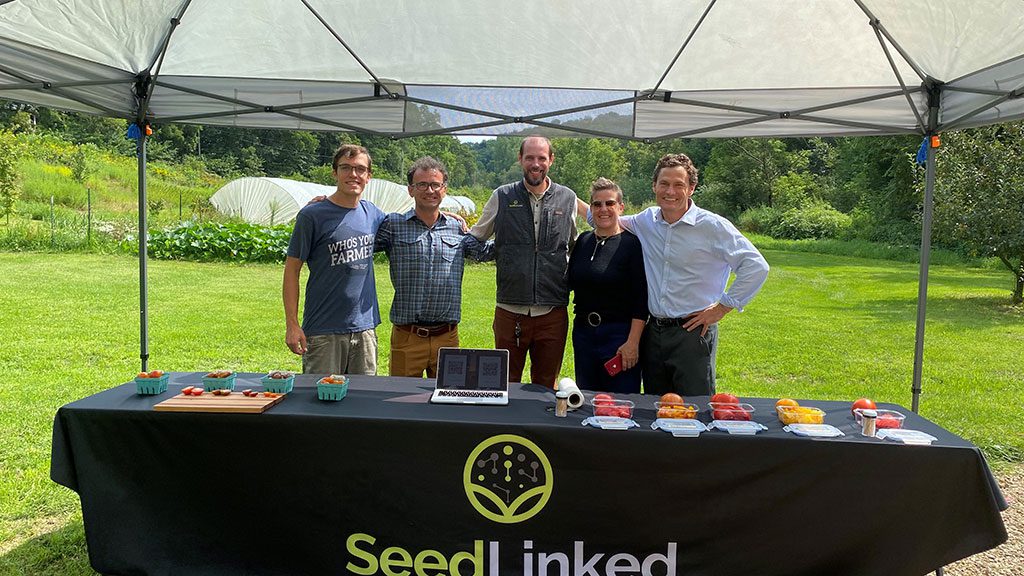
From left to right: SeedLinked co-founders Dylan Bruce, Nico Enjalbert and Bjorn Bergman, hold a tomato tasting on Bruce’s organic farm for WEDC Secretary Missy Hughes and Deputy Secretary Sam Rikkers.
Lately, several companies in Wisconsin’s farm technology sector have found the seeds of success in WEDC’s Qualified New Business Venture Program, which helps young companies attract investment by offering investors tax credits when they invest in companies that are certified through the program.
“Farming is such an integral part of our state and regional economy, so helping industry-changing products in their early stages is a key mission of ours,” said Missy Hughes, secretary and CEO of WEDC, the state’s lead economic development organization.
Startup and early-stage companies receiving QNBV certification can leverage new capital because their investors are eligible to receive a 25% state tax credit on the amount they invest in certified businesses.
The program’s goal is to stimulate investment and nurture entrepreneurship by helping cutting-edge companies in farm technology and other sectors attract capital and boost the state’s potential for growth and job creation.
And the promise of agricultural technology seems bright in Wisconsin. Speaking at the inaugural Wisconsin Economic Summit in Appleton last month, futurist and author Rebecca Ryan was bullish on ag tech.
“China has a 100-year plan,” she said. “I would love to see the state of Wisconsin have a 100-year plan, and ag tech being part of the center of that.”
Ryan added: “[Agriculture] is one of our signature strengths and it cannot be exported to another place. … The laboratory is here.”
Fitchburg-based Isomark LLC is developing a hardware-enabling software that identifies pre-symptomatic infections in an animal’s breath. Using its software, farmers can detect an infection in 30 seconds, enabling them to intervene before a potentially catastrophic spread. Isomark’s product will reduce precautionary, often unnecessary antibiotic use and allow consumers to better know what’s in the meat and dairy they’re purchasing. Isomark successfully completed four pilot programs, sold two units in 2022 and is gaining prominence.
“The QNBV Program is a great program for startups and companies pursuing funds because it incentivizes the investor to make that investment,” said Jack Heinemann, Isomark’s president. “It’s helped us a lot with Wisconsin investors.”
The tax credit program also helped Madison’s Agrograph Inc. succeed. The fast-growing company uses satellite imaging to observe farms and their crop-growing performance. Agrograph helps educate financial institutions on what size loans, if any, to give farmers. The company calls itself “The Credit Score of Agriculture™.” Founded by Mutlu Ozdogan and James O’Brien in 2012, today it provides services in nearly every state while doing about a third of its business outside of North America.
“It’s definitely a win-win,” O’Brien said of the QNBV Program. “It allows investors to have the tax advantages of making an investment, and it benefits us because investors are putting those dollars into our company.”
Madison-based Field Prophet Inc., founded in 2020, is also certified as a QNBV. The firm analyzes weather patterns and informs farmers when environmental conditions are conducive to infection-causing pathogens among corn and soybean crops. The app saves farmers money by addressing at-risk crops and reducing uninformed chemical use. One Wisconsin farmer said Field Prophet saved him $10,000 in a single growing season. Unlike most farming apps, Field Prophet can be used anonymously and doesn’t collect user data, offering farmers privacy and security.
Roger Schmidt, cofounder and CTO at Field Prophet, also appreciates the benefits of the QNBV program as his firm grows.
“The thing we like about being a QNBV-certified business is that it lends credibility to our business when we have investors looking at us,” Schmidt said. “We renewed our certification a few months ago for that reason. We want to still have the credits available, but we also want that credibility where the state believes in us. That’s critical for a young business.”
Another QNBV-certified company, Viroqua-based SeedLinked, offers a new, tailored approach to seed selection and crop growth. Users’ geolocated reviews detail seed performance and inform others about which varieties might be most successful in a specific region. Both gardeners growing food for home use and farmers cultivating on a large scale can use the SeedLinked platform to improve their results and save money.
“SeedLinked connects the untapped knowledge of 500 million small growers worldwide that produce 70% of the global food supply via crowdsourcing technology,” says the company’s CEO, Nico Enjalbert. “We dream of an agricultural system that has greater crop diversity, is more connected to help all stakeholders in the seed supply chain and builds a better world.”
Bjorn Bergman, the company’s cofounder and marketing lead, said that because of investment made possible by the QNBV Program, “We were able to hire a couple other people and keep more developers hired for a longer period of time. It’ just helped us develop more of our software and fully develop the first iteration of our marketplace.”
